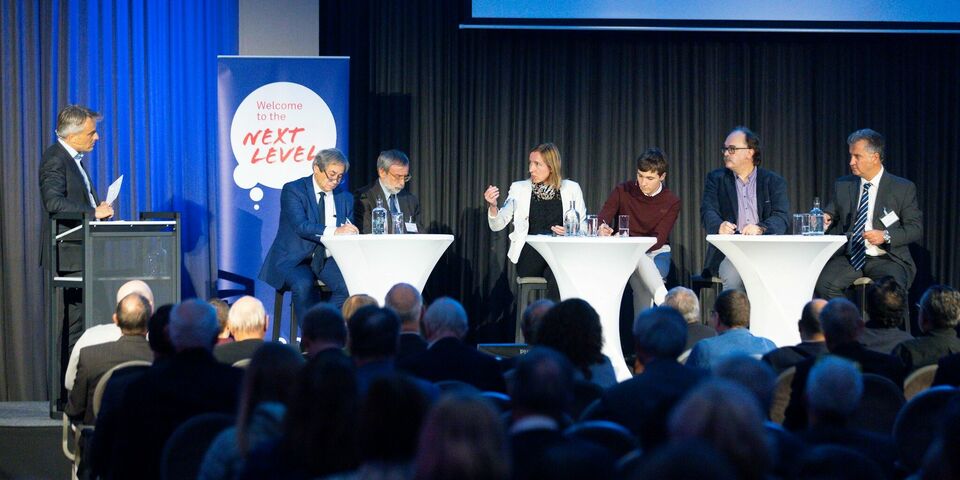How to deal with disposable packaging?
Plastics, we can’t live without them, but they’re also causing us problems. Polymeric materials have become a growing challenge to today’s society and to our environment, it says in the invitation to the 22nd annual meeting of the DPI, the Polymer Research Platform. A panel discussion - moderated by journalist Joris Luyendijk - was held, centering around the topical issue ‘The Role of Plastics in the Circular Economy, Today and Tomorrow.’
The panel is seated in a row behind a couple of tables in a large, packed conference room of the Van der Valk hotel Eindhoven. The panel members are researchers at various European universities and management representatives of knowledge institute Knowfort and the R&D department of PepsiCo. They share their views on the complex issue of minimizing the production of plastics, which have become such an indispensable commodity.
Luyendijk tries to enliven the discussion by arguing that a solution to the waste problem is taking too long. Ellen de Brabander, Vice President R&D at PepsiCo, says that it can’t go any faster and that PepsiCo has set itself the goal to make every single one of its bottles recyclable by 2025. “That goal is amazing,” says Shahab Jahromi of Knowfort Technologies. He says that the development of a successful alternative to the current packaging material will take a lot of work.
He makes a crackling noise with a bag of chips and calls it a wonder of technology. “This bag has seven layers, and each layer has a different function. The two aluminum layers, for example, ensure that the chips stay crispy. The bag remains intact for fifty years, and yes, eventually ends up in the food chain. Developing something equally strong and with a better biodegradability will take a revolution that could be compared to the development of the mobile telephone towards a smartphone.”
De Brabander nevertheless believes that PepsiCo doesn’t promise too much, but she does point out that the hard plastics her company works with are entirely different from the more flexible packaging materials Jahromi was talking about.
Desperation
“When adults become desperate, they turn towards the next generation,” Luyendijk says as he turns to the youngest panel member, Fionn Ferreira from Ireland. The student at the University of Groningen and winner of the Google Science Fair 2019 concerns himself with mircoplastics ‘out of love for nature’ and came up with a method to extract microplastics from water using magnets and oil. No, he doesn’t have a ready-made solution, “but I try to think creatively.”
It doesn’t feel quite right, says Luyendijk. “On the one hand, there’s this nightmare scenario in which all sources dry up and people will be fighting over the remaining materials in fifty years, and on the other hand we’ve just heard a solution that will take only a small sacrifice but is still considered difficult: making slightly less crispy chips.”
Dealing with disposable packaging material remains a complex issue. “The industry only tries so save itself,” warns professor Vincenzo Buscio from Italy as he looks at De Brabander. Funny, because this is what DPI director Jacques Joosten said before the panel discussion started: “We need to solve the waste problem together. In doing so, it is of the utmost importance that we name those who should take responsibility.”
Farewell
This will be DPI’s final annual meeting under supervision of director Jacques Joosten. We talk to him about the bond between TU/e and DPI. “Traditionally, DPI and TU/e always had a strong bond,” says Joosten, who will retire as director of the institute after fourteen years. “DPI started out small in 1997, as an initiative of TU/e professor Piet Lemstra and a number of Dutch polymer companies. During its heyday in 2010-2012, DPI had two hundred people working on projects, and 45 companies were involved.”
Joosten has faced some turbulent times when the government made considerable cutbacks and TU/e decided to focus more on other process technologies and less on polymer research. “But we managed to recover form the low point of 2016 - when we only had twelve companies left on board - and found the upward trend again, with twenty companies at this point. We currently have ten projects in progress in which fifteen researchers from TU/e are involved. That’s still a fairly large part, one quarter of the total number of researchers.”




Discussion